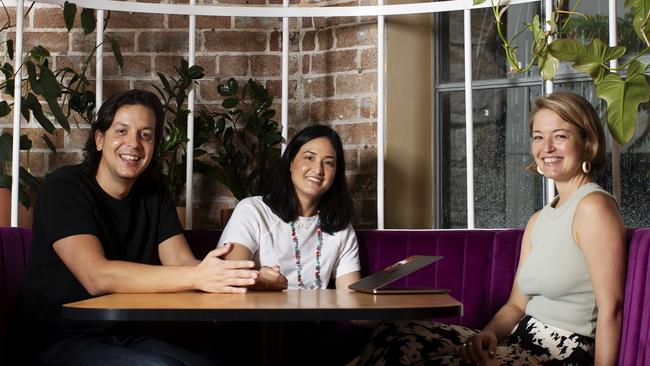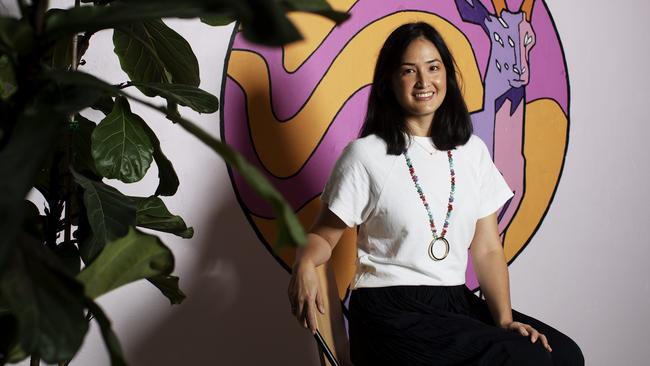‘Unicorn factory’ Blackbird details its billion-dollar plan
Australia’s biggest venture capital firm, Blackbird Ventures, has lifted the lid on its three new funds, which it will use to back the next Canva or Culture Amp.

Australia’s largest venture capital firm, Blackbird Ventures, has detailed its plans to raise at least $1bn, and partners are declaring there has never been a better time to be an Australian start-up founder.
Blackbird is capitalising on red-hot demand to find the next Canva or Culture Amp, tapping investors this month to back three new funds that will be deployed to back Australian and New Zealand early-stage companies, and double down on billion-dollar success stories.
Lifting the lid on Blackbird’s agenda for the year, partner Nick Crocker said that, despite the global macro environment and software companies falling from their peak valuations, it was still an ideal time to be a tech entrepreneur. And an ideal time to raise at least $1bn in funds to back them.
“Society is really valuing the entrepreneur right now. And when a good entrepreneur comes to us, there’ll likely be multiple people trying to fund them,” he said. “It’s quite wild just the level of interest in finding and funding early-stage founders right now.
“The other thing that’s been fascinating is that Australia’s software companies are big enough now that entrepreneurs are starting to come out of them, from places like SafetyCulture, Culture Amp, Canva, and Eucalyptus. You’re starting to see the next generation of founders come through, and that’s a real sign of maturity for our ecosystem.”
Founded in 2012, Blackbird is now entering its second decade, but partner Sam Wong said its executives were still building the company like a start-up, rather than a traditional venture capital firm. Based in Sydney’s inner-city Surry Hills, the firm has about 50 employees, or “Blackbirds”, and will probably pass 100 by the end of next year.
“As we grow we want to maintain our special culture and stay in the weeds with our founders and community,” Ms Wong said.
“Just as we invest in the most ambitious founders, we want our team to be equally ambitious and hope to prove that it is possible to build a generational investment firm outside of Silicon Valley, Wall Street or London.
“When Blackbird was first founded in 2012, there were around 200 start-ups getting founded each year in Australia. A decade later and that number is closer to 1000. We believe that this number will continue to grow exponentially every year as technology continues to eat up every industry and so we too must grow our funds to hopefully be a part of the iconic companies that will be born over the coming years.”

Blackbird’s strategy for 2022 is centred around three funds – an Australian core fund of between $200m and $300m, a New Zealand fund of $NZ100m-$NZ150m ($92m-$137m), and a follow-on fund worth $700m-$1.3bn.
Ms Wong said with these funds she hoped Blackbird would be founders’ first choice in seeking funding, in what has quickly become a highly competitive venture capital landscape.
The big worry for Blackbird, according to Mr Crocker, is that early-stage founders get intimidated by the sheer size of the company’s $1bn fund and don’t bother inquiring.
“Actually what happens is that as we get bigger, we are investing earlier and earlier,” he said. “The first investment we did from our last fund was $34,000. And two-thirds of the companies we invest in are pre-revenue.
“In a couple of deals recently, we’ve been delayed in wiring our money by the founders going through the process of registering a company to then get a bank account. When you’re waiting for the founder to set up a bank account, that’s when you know you invested early enough. That is our sweet spot.”
The firm’s biggest bet is its follow-on fund, a war chest of up to $1.3bn that will be used to cement significant stakes in billion-dollar businesses.
“Our follow-on strategy positions us so well to go on the whole journey with the founders. We raise core funds that do all our early-stage investing, and we raise follow-on funds that invest into the best of the companies from the core funds,” Mr Crocker said.
“Because the follow-on funds are much larger, we’re able to participate meaningfully in every round that companies raise.
“The only way early-stage companies get to access those funds is by really succeeding. That’s so core to our whole thesis, which is not that we invest once and hope that it works. We invest once in the hope that we can invest hundreds of millions of dollars over time to build generational ownership in generational companies.”
Blackbird’s success to date has been in large part due to the wild success of some of its earliest bets such as in Canva, Safety Culture and Culture Amp, which have each grown from just a couple of employees to hundreds, and in Canva’s case thousands. Its mission now is to find the next Canva or Culture Amp, with its core fund targeting 25-30 investments.
Mr Crocker said software-as-a-service companies such as Canva were still Blackbird’s bread and butter, but the company had in recent years expanded its focus to alternative protein companies such as Fable, and deep tech such as artificial intelligence and healthcare technology.
“We’ve always been enamoured with science nonfiction, ideas that seem like science fiction but are actually totally realisable – things like autonomous cars, rockets, and lasers,” he said.
He said Blackbird was unique globally in publishing its returns on its website, returns that were competitive. “That track record, and the quality of the businesses we’ve partnered with is what resonates with investors,” he said.
“Especially when you consider that we are, in each case, the largest external shareholder in those businesses. That story is pretty hard to replicate. You need 10 exceptional years to let that story play out. And I think the next generation of founders have equal potential; companies like Eucalyptus and Dovetail.”
Blackbird has also been bolstered in the past 12 months by the arrival of Robyn Denholm, Tesla’s chair and a veteran entrepreneur in her own right who now serves as Blackbird operating partner. Mr Crocker said he had been taken aback by the level of her input, and how hands-on she had been with the company’s founders.
“I pinch myself every day that I get to work with Robyn,” he said. “She’s built one-on-one relationships with so many of our founder community directly. She’s at the coalface with them daily.
“We’re scaling really fast, and none of the partners have scaled a business beyond where Blackbird is today.” Ms Denholm had “been there and done that many times over … and in our partner meetings she’ll have nuggets of wisdom or observations that will reorient us in a constructive way.”
Ms Wong said Blackbird’s goal was to build the most valuable founder community in the region.
“Our ambition for our ecosystem and for Blackbird itself is as wild and boundless as the founders we back,” she said.
“We are 10 years young and just getting started.”






To join the conversation, please log in. Don't have an account? Register
Join the conversation, you are commenting as Logout